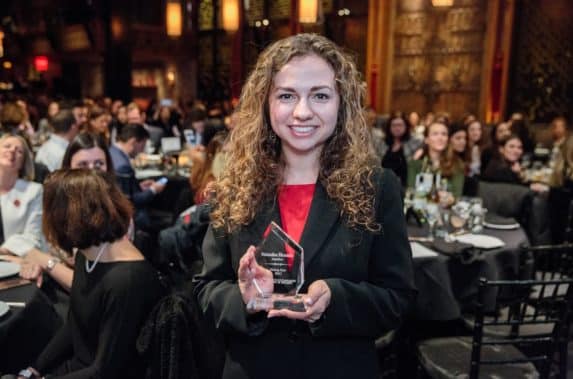Natasha Shamis, Global Head of Product at Liquidnet, was recognized as a Rising Star at Markets Media’s 2017 Women in Finance Awards. Markets Media recently caught up with Natasha to hear more about her background, what she’s working on currently, and her views about women in finance generally.
Talk a little about your unique career path. What factors were important for your success?
I studied computer science at Columbia University, and my technical background has been key in the evolution of my career path to leading the design for innovative technology-powered products. I began my career as a software developer at Bank of America, moving into a product role when joining Liquidnet. I focused my early years at Liquidnet on progressing my career laterally by developing my subject matter expertise within as many product areas as possible. This lateral growth paid off when I had an opportunity in 2014 to lead the evolution of Liquidnet’s trading platform, which required an understanding across multiple product areas that were being integrated. The project I undertook at that time was on a failing trajectory and attempting to course-correct it was a big risk, but the payoff for success was a leadership position as Liquidnet’s Global Head of Product, so I took the risk and ultimately succeeded.
Beyond technical expertise, lateral learning, and risk-taking, a major factor in my success was Liquidnet’s culture of meritocracy, which prioritized my capabilities over my years of experience. Liquidnet allowed and enabled my growth, and welcomed me with a seat the leadership table. Over the last five years, I have grown my team from two product managers to a global team of thirty, spanning product managers, user experience designers, and data analysts. As I continue to look at new opportunities for making an impact in the financial industry, the strength and collaboration of my team is key to achieving those ambitions.
Have you had any notable mentors / role models?
I have been fortunate to have a number of mentors and sponsors throughout my career, three of whom were especially pivotal in the path I have taken.
Yevgeniy Zaremba, who was a lead within Bank of America’s Electronic Trading Technology team while I was an associate there, introduced me to the world of finance and the role of technology in advancing the industry; he mentored me throughout my time at Bank of America, teaching me solutions-based thinking and relationship management, and supporting my move to Liquidnet and career progression into product management.
A few years later, my transition from a solely internal product focus to a customer-centric one was aided by my business partner at the time, Sandra Delmore, the Global Head of Liquidnet’s Commission Management Service; she inspired me with her exceptional ability to listen to customers, create partnerships, provide best-in-class service, and maintain tight-knit relationships across numerous asset managers throughout the industry.
I am in my twelfth year at Liquidnet, and one of my greatest mentors and inspirations has been Liquidnet’s CEO, Seth Merrin, who has led by example in creating a phenomenal culture at the firm of collaboration coupled with drive, of constant innovation and freedom of thought; it is this culture that has guided me in the principles I employ within my team.
How do you “give back”, in terms of for example charitable causes or mentorship?
I am passionate about supporting youth in finding their path in life and play an active role in the Agahozo-Shalom Youth Village, which helps vulnerable children in Rwanda get an education and a family support system that enables them to thrive. Locally, I mentor young girls interested in computer science professions through a Liquidnet-sponsored summer program called Camp Codea, which immerses high school-aged girls in the world of financial technology and provides them with advice and resources to help them pursue a role in this field if they so choose.
What is the impact that you aim to make in this industry?
The application of Artificial Intelligence is still in its nascency in financial services. Looking beyond our industry at firms such as Netflix and Amazon, a level of personalization has been introduced to our interaction with media and consumer products that has not yet penetrated the financial industry. I aim to leverage Artificial Intelligence to bring personalization to the investment process the way Netflix did to television. If trading products follow consumer products, we should expect that the future of trading will involve scrolling down streams of personalized trading notifications on your mobile device, pinch-to-zooming on price and volume charts, seeing how many traders liked each notification, how many had your trading style, and changing your trading strategy with just a few taps.
What would be your advice to young women considering a career in finance?
The financial industry has become increasingly more technology-driven, and the skillset required to be competitive in this space is more technical and quantitative than in the past. I would advise anyone seeking a career in financial services to obtain a technical and quantitative background, as these are the skills that will enable new entrants to play a leading role in the evolution of the business landscape.
What is the importance of an event recognizing top women in finance?
Recognition of talent is important in any industry to set an example of the skills, career paths, and obstacle-handling strategies that can lead a person to achieve their ambitions and inspire others to do the same. In line with this reasoning, recognizing top women in finance sets an example that is relatable to women embarking on their careers, and fortunately a more realistic expectation than media that portrays the early Wall Street era. With events such as the Markets Media Women in Finance Awards, women have a contemporary example of the industry showing what they can achieve.
How would you like to see the conversation about women on Wall Street evolve?
In a true meritocracy, people are not pointed out by gender or by color; they are recognized for their talent, all other personal attributes being irrelevant. Due to the gender gap in this industry, and the historically toxic environment that women encountered, it has been imperative to create focus groups, support forums, and recruiting programs that aim to bring and keep more women in the financial services industry. It is my hope that the industry evolves to a point where the gender gap is a thing of the past, and women on Wall Street achieve merit-based recognition no differently or less naturally than their male counterparts.
More from Natasha Shamis:







